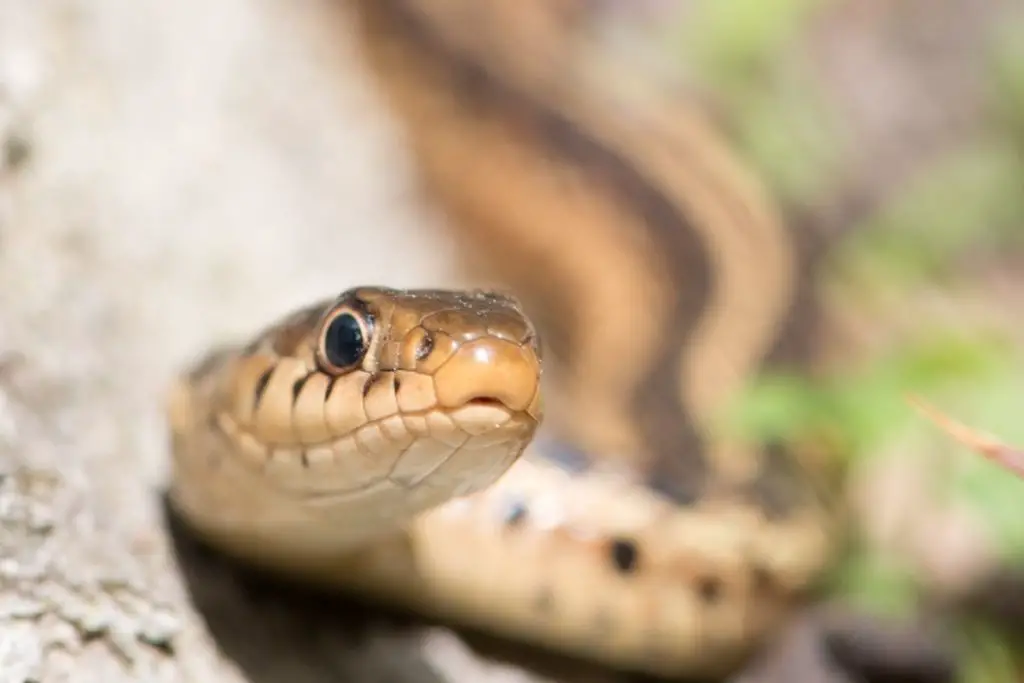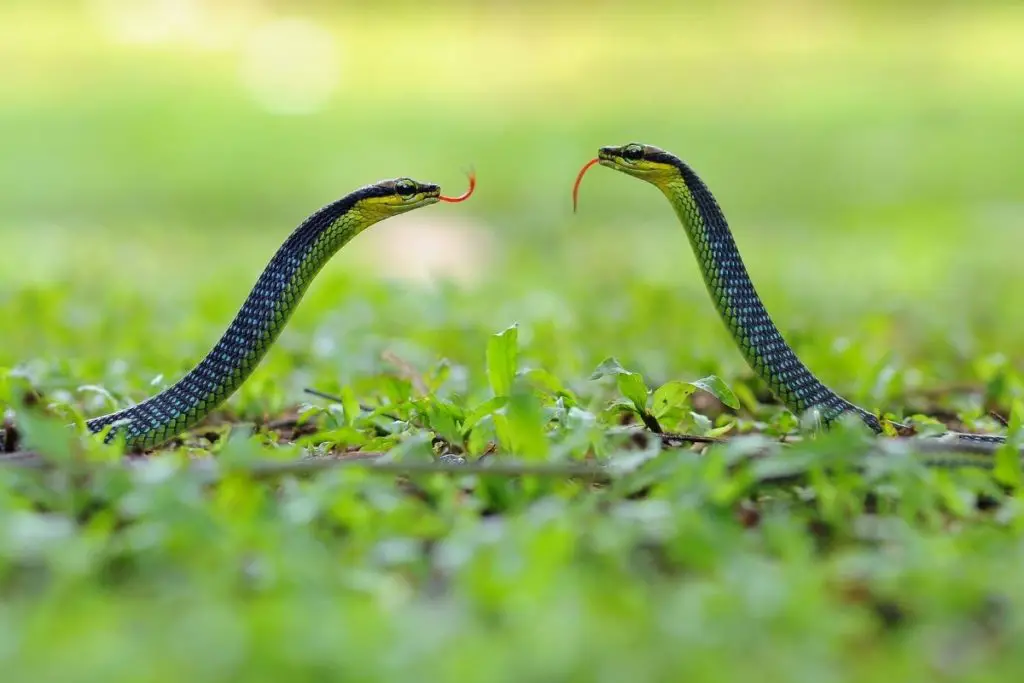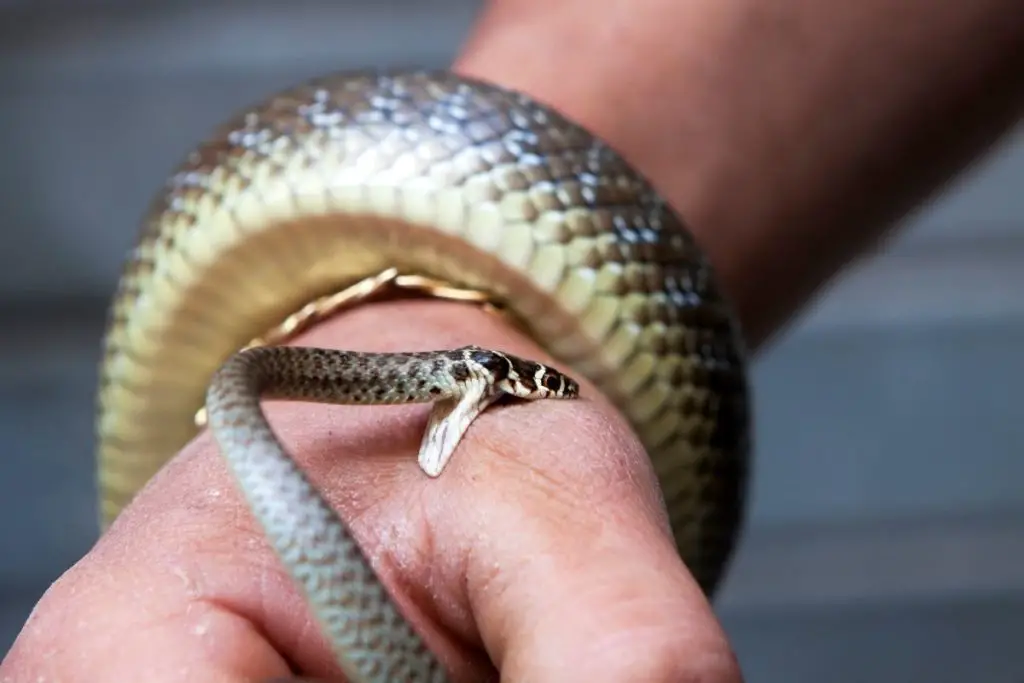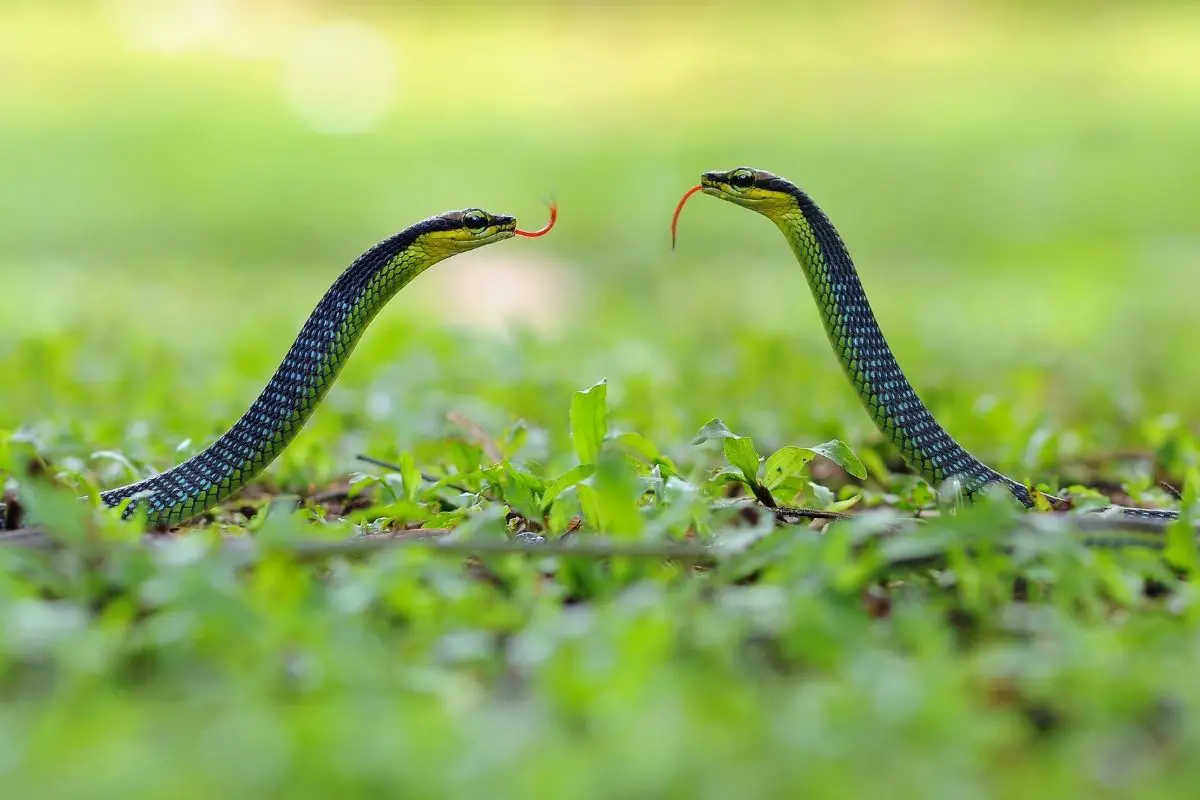Humans are wired to fear snakes and we find them to be so mysterious. This is why, over the centuries, many beliefs around snakes have been popular even though some of them are not true at all.
Being revengeful is one of those common misbeliefs. So, let’s answer this question once and for all.
Do Snakes take revenge? Snakes do not take revenge because they simply do not have the memory to remember humans. If you kill a snake and another snake attacks you, it’s because the first snake sprayed you with its musk which is what attracted the other snake to you.
In other words; yes, you may be attacked by a snake for something you have done to it or to another snake, but that’s not because the snake is taking revenge, but rather due to other reasons completely.
To understand what will happen in these situations, and why your snake could be attacking you for something you’ve done earlier or to another snake, keep reading…
Contents
Do Snakes have memories?

Snakes do not have a memory like humans do. They do not recognize people or places because their brain is too small to store long-term information in the form of memory.
This should be enough to show that many of the beliefs most people have about snakes are simply false and have no proof.
However, if you do something bad to a snake, even unintentionally, it may still bite you in the future or not tolerate your touch or allow you to handle it at all. Does this mean that the snake remembers what you have done? No, let’s explain this…
How snakes “remember” things
As explained earlier, snakes do not have a good long-term memory that enables them to remember events or even faces.
Yes, snakes can’t even remember their owner’s faces and your snake can not pick you out of a crowd based on appearance alone.
Instead, snakes remember things by association. Snakes have a very good sense of smell, and they will remember your scent and associate it with your actions.
If you feed your snake and it feels safe around you, your snake will associate your scent with being safe and being fed, and they will be happy to smell you at any time.
The opposite is also true, if you mistreat your snake, it will associate your scent with being a threat, and it will not tolerate you handling it.
You can learn how to know if your snakes like you holding, petting, handling, or touching it here.
Do Snakes take revenge for their partners?

Snakes do not take revenge for their partners. If you kill a snake, it’s true that another snake may bite you, but this is not because the snake’s partner is taking revenge.
First of all, snakes do not have partners. Snakes are solitary, and the only time two snakes will be in the same space is when it’s mating season, but other than that, a snake will not have a “partner” in any long-term way.
Snakes also don’t care about what happens to other snakes, like, at all. Since they don’t have a memory, snakes will not even care about what happens to their babies, and most mommy snakes leave their babies right after they hatch or shortly before even.
So, what happens, then?
What happens is that when you kill a snake, it will expel its musk on you, and this smell is strong enough for other nearby snakes to detect it and they will show up to investigate the musk to see if it’s a suitable mate.
When it finds you instead, the snake will be startled and if you act suddenly, the snake will strike, because that’s what snakes do.
Snakes do not take revenge, but they do defend themselves and attack when threatened.
If you do something bad to a snake that has a partner, then the other snake may attack or bite you out of self-defense if it feels its life is in danger.
But these cases are very rare as snakes tend to avoid conflict and do not like to fight.
If you do something bad to one snake it may attack or bite in self-defense if its life is in danger, but the other snake will not remember what happened at all.
Can Snakes be angry?
Snakes can’t be angry because snakes do not have a complex brain, and they do not experience emotions like humans do.
They do not feel anger or happiness either. Snakes only respond to their environment based on instinct, but if you mistreat your snake, it will associate your scent with being a threat and the next time it smells that scent, it will do whatever is necessary to defend itself.
If this means biting, then the snake may bite you, but since snakes can’t feel anger or happiness either way, there’s no reason for them to do so if they are not in danger.
Can Snakes hold grudges?

Snakes do not hold grudges, but they make associations with bad experiences and remember these associations, so your smell may mean a threat to them if you mistreat them in the past, but it doesn’t mean that the snake has a grudge against you, in particular.
Snakes do not remember things by faces or events, so they do not “hold grudges” against people.
If you mistreat your snake, it will remember the scent and associate it with being a threat, but that’s as far as it goes.
A snake will not remember what happened yesterday or the last time you handled it, it will only remember what happened the last time it smelled your scent. By the way, if you are new into snake ownership, you can learn if there are any snakes that don’t bite here.
Do Snakes chase humans?
Unlucky individuals who startle, whether intentionally or not, sleeping or unaware snakes are helping create this myth.
When someone discovers a snake, most of the time, it’s a surprise to both parties, and both end up panicking. This person may experience trembling knees and a quicker pulse as the snake quickly flees the scene, but do not fear for your life. Snakes are far more scared of you than you are of them.
Snakes do not chase people down just to get revenge on humans, they do so because that’s their instinctual response to being startled or feeling threatened in any way.
This myth, however, is actually kind of true, at least for some species.
Some snakes, such as the Central American bushmaster will actively “chase” people.
The bushmaster is well-known for pursuing humans. This is particularly bad because this is a large and de venomous snake. Panama’s tourism board actually warns guests about the aggressive behavior of these snakes and has erected signs in areas where the snakes have been known to frequent.
While most snakes do not exhibit this behavior, it is important to be aware of the fact that some do, so if you are hiking or walking in an area where there is a snake population, it’s best to stay on the lookout.
If a person encounters a snake, do not do anything to startle it as you do not want that animal to associate your scent with danger.
You should slowly back away from the area and leave the scene without any sudden movements or loud noises. If someone has already startled a sleeping (or unaware) snake in their backyard, they can take preventative measures by securing the area, but do not do anything to harm the snake.
Conclusion
In conclusion, snakes do not take revenge on humans, but they will defend themselves if they feel threatened. Snakes do not experience emotions like anger or happiness, so there’s no reason for them to do so if they are not in danger.
Additionally, snakes do not remember things by faces or events, they only remember what happened the last time they smelled your scent.
If you mistreat your snake, it will remember the scent and associate it with being a threat, but that’s as far as it goes. The bottom line? Don’t be afraid of snakes – they’re more afraid of you than you are of them!
Helpful Resources
Secrets of Snakes: The Science Beyond the Myths by David A. Steen
Given the Cold Shoulder: A Review of the Scientific Literature for Evidence of Reptile Sentience
If you like this article, please share it!


